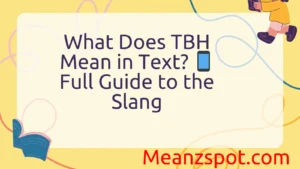In the ever-evolving world of text slang, two-letter abbreviations can pack a surprising punch—and “HU” is no exception. Whether you’re scrolling through Snapchat stories, chatting on Instagram, or reading someone’s DMs, you’ve likely come across this puzzling shorthand and wondered: “What does HU mean in text?”
As of 2025, the meaning of “HU” continues to trend across social media platforms, making it essential for anyone trying to stay up-to-date with modern digital lingo. But here’s the twist—“HU” doesn’t have just one meaning. Like many internet abbreviations, it shifts based on context, who’s saying it, and where it’s being used.
In this slang breakdown, we’ll explore the most popular definitions, where it came from, and how to use or interpret it across different apps. Whether you’re texting Gen Z friends or trying to decode your teen’s messages, this guide will give you all the clarity you need.
Definitions & Meaning
In text messaging and online chats, HU typically stands for “How You” or “Hit Up.” The most common interpretation is “How You”, which is shorthand for the phrase “How are you?” or “How you doing?” It is used as a casual greeting or inquiry about someone’s well-being.
For example, if someone texts you:
- “HU?”
They likely mean:
- “How are you?” or “What’s up?”
Alternatively, HU can also mean “Hit Up,” which means to contact or reach out to someone. For instance:
- “I’ll HU you later” means “I’ll contact you later.”
This abbreviation is mainly informal and used in casual conversations rather than professional settings.
Examples:
- HU? → How are you?
- HU later? → Hit you up later (meaning: I’ll contact you later)
Origins & History
The abbreviation HU emerged alongside the rise of texting and instant messaging, where users sought to shorten common phrases to save time and typing effort. The practice of shortening phrases dates back to the early days of SMS texting when character limits made brevity necessary.
The use of HU as “How you” likely grew from African American Vernacular English (AAVE) and urban slang, where informal greetings like “How you?” are common conversational starters. Over time, this phrase was condensed into just “HU” to fit the fast, casual style of texting.
The “Hit Up” meaning is tied to slang culture from the 1990s and 2000s hip-hop communities, where “hit up” became synonymous with reaching out to someone. This phrase naturally migrated into texting culture, where HU became a convenient abbreviation.
With social media platforms like Twitter and Instagram emphasizing quick and concise communication, abbreviations like HU have cemented their place in everyday digital language.
Usage in Different Contexts
Social Media & Texting
On social media and in casual texting, HU is a quick way to say hello or check in on someone. It’s informal and often used among friends or peers.
- “Hey, HU?” = “Hey, how are you?”
Sometimes, it’s used as an invitation to start a conversation:
- “HU me when you’re free.” (Contact me when you’re free.)
Professional & Formal Contexts
In professional or formal communication, HU is rarely used because it is considered too casual and may come off as unprofessional or unclear. Instead, more formal greetings like “How are you?” or “Please contact me” are preferred.
Pop Culture & Gaming
In gaming communities and pop culture, HU might also pop up, usually meaning “Hit Up,” encouraging someone to contact or invite others.
- “HU if you want to join the team.”
Here, it’s about coordinating or social interaction within a community.
Common Misunderstandings & Clarifications
One common confusion with HU is mistaking it for an acronym with a fixed meaning, like other well-known acronyms (e.g., LOL or BRB). Because HU can mean different things depending on context, it’s essential to interpret it carefully.
Sometimes people mistake HU for a typo or an incomplete message. If the context is unclear, asking for clarification is always best.
Another misunderstanding is confusing HU with similar acronyms such as:
- HBU: How ‘bout you?
- HUH: An expression of confusion or asking for repetition.
Each of these has distinct meanings, so knowing the difference helps avoid miscommunication.
Alternatives & Synonyms
If you want to use something similar to HU but with clearer or more widely recognized terms, here are some alternatives:
- How are you? (Full phrase, formal)
- HBU – How ‘bout you? (casual)
- Sup? – Short for What’s up?
- Hey, how’s it going?
- Ping me – Another way of saying contact me
- DM me – Direct message me (common on social media)
Choosing alternatives depends on the tone and the audience you are addressing.
Frequently Asked Questions (FAQ)
1. What does HU mean in texting?
HU usually means “How you?” (How are you?) or “Hit up” (contact me).
2. Is HU a formal abbreviation?
No, HU is informal and best used in casual conversations.
3. Can HU mean “Hit Up” and “How You” at the same time?
Yes, context usually clarifies which meaning is intended.
4. How is HU different from HBU?
HBU means “How about you?” while HU means “How you?” or “Hit Up.”
5. Should I use HU in professional emails?
No, it’s better to use full, formal greetings in professional communication.
6. Is HU commonly used worldwide?
It’s mostly common in English-speaking online communities and may not be understood everywhere.
7. How can I respond to HU in a conversation?
You can respond with a brief update like “I’m good, thanks! HU?” meaning “How about you?”
Conclusion
The abbreviation HU is a versatile and informal piece of texting slang primarily meaning “How you?” or “Hit up.” Its roots lie in early SMS culture and slang, evolving to suit the rapid pace of digital communication. While it’s popular in casual social media and texting among friends, it’s important to avoid using HU in formal settings to maintain professionalism. Understanding the context is key, as HU can have multiple interpretations. By familiarizing yourself with such acronyms, you can better navigate modern conversations and stay connected in today’s fast-evolving digital language landscape. Whether you’re saying “HU?” to check in or “HU you later” to plan a catch-up, this little abbreviation packs a big punch in casual communication.



